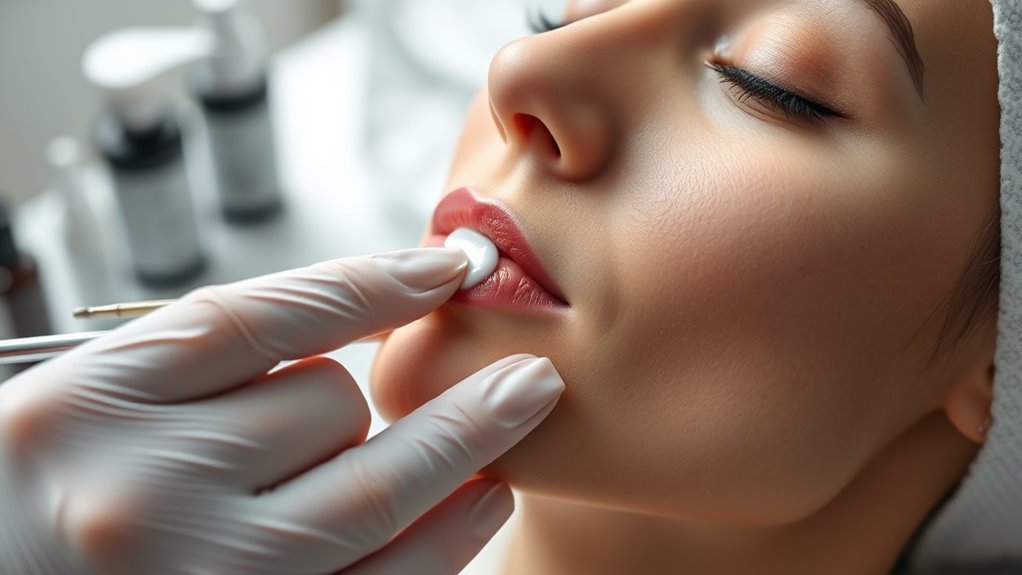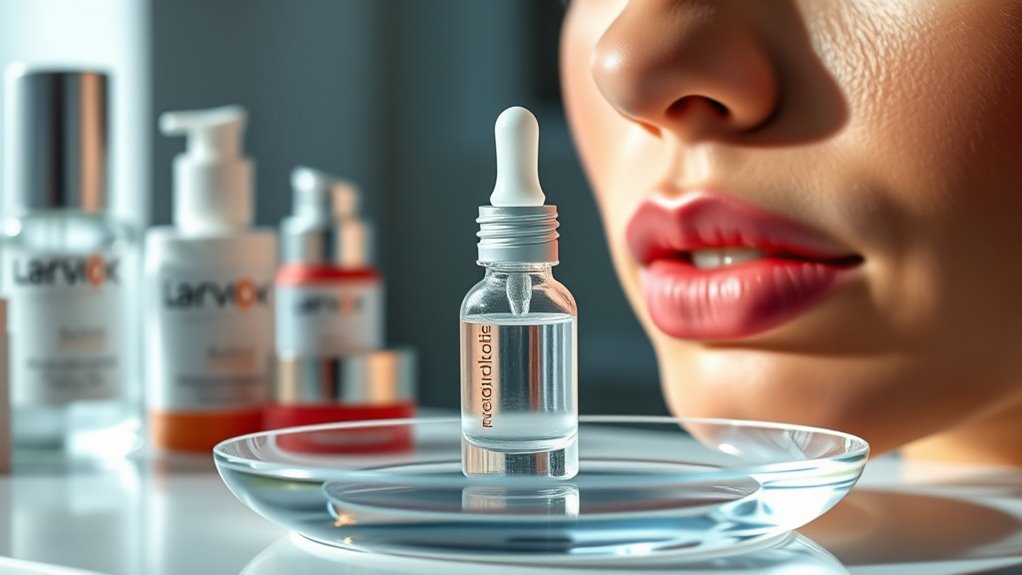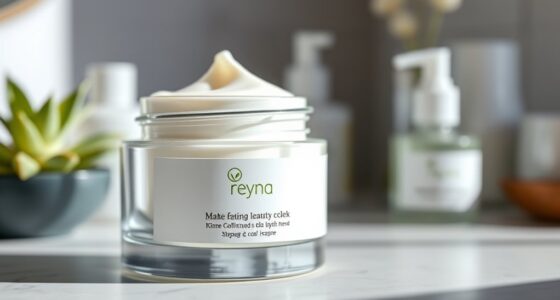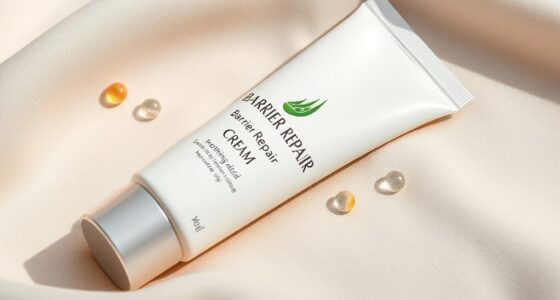To use retinoids safely and effectively, start with a clean, dry face and apply a pea-sized amount, gently spreading outward while avoiding sensitive areas. Begin with less frequent use, like every other night, and gradually increase as your skin builds tolerance. Always wear broad-spectrum sunscreen during the day and avoid harsh cleansers. Manage irritation with moisturizers, and consult a dermatologist if issues persist. Following these tips helps you get the best results with minimal risk.
Key Takeaways
- Start with a small amount and gradually increase frequency to build tolerance and minimize irritation.
- Always apply retinoids on clean, dry skin and avoid the eye and mouth areas.
- Use broad-spectrum sunscreen daily to protect skin from increased photosensitivity.
- Incorporate moisturizing and barrier-repair ingredients to reduce dryness and irritation.
- Consult a dermatologist if persistent irritation or adverse reactions occur during use.

Retinoids are powerful skincare ingredients that can transform your complexion, but using them correctly is essential to avoid irritation and maximize benefits. The key to successful retinoid use starts with proper retinoid application. You should begin by cleansing your skin thoroughly, removing dirt and excess oils, before applying a pea-sized amount of retinoid product. Dot it onto your forehead, cheeks, chin, and nose, then gently spread it outward, avoiding the sensitive skin around your eyes and corners of your mouth. Applying retinoids on clean, dry skin helps reduce the risk of irritation and guarantees better absorption. It’s best to start slow—using retinoids every other night or even twice a week—so your skin can gradually build tolerance. Over time, as your skin adapts, you can increase frequency, but always pay attention to how your skin responds. Incorporating proper application techniques can significantly improve the overall effectiveness of retinoids.
Skin irritation management is a pivotal aspect of retinoid use. Mild redness, dryness, and peeling are common initially, but they shouldn’t persist or worsen. If irritation occurs, cut back on application frequency and consider using a moisturizer beforehand to create a buffer layer. If dryness or redness becomes severe, pause retinoid use and consult a dermatologist. Incorporating hydrating and barrier-repair ingredients like ceramides and hyaluronic acid into your routine can also help manage irritation. When applying retinoids, avoid harsh cleansers or exfoliants that might exacerbate sensitivity, and always wear a broad-spectrum sunscreen during the day, as retinoids increase photosensitivity. Additionally, understanding the importance of contrast ratio can help you choose suitable skincare products and lighting conditions for your routine.
Consistency is indispensable for seeing results, but rushing the process can lead to setbacks. Always follow the specific instructions provided with your product, and don’t combine retinoids with other potentially irritating actives like alpha hydroxy acids or vitamin C unless approved by a dermatologist. If you experience persistent irritation despite proper application, it’s wise to reconsider your product choice or concentration. Remember, patience is key; retinoids work gradually by promoting cellular turnover, so results take time. By focusing on correct retinoid application and skin irritation management, you’ll set yourself up for the safest and most effective use of this powerful ingredient, ultimately achieving clearer, smoother skin without unnecessary discomfort.
Frequently Asked Questions
Can Retinoids Be Safely Used During Pregnancy?
You should avoid using retinoids during pregnancy because of pregnancy safety concerns. Retinoid risks are significant, as they can cause birth defects. It’s best to consult your healthcare provider before starting any skincare products. They might recommend alternatives that are safe for you and your baby. Never assume over-the-counter retinoids are safe during pregnancy, and always prioritize professional advice to ensure your safety.
How Do Retinoids Affect Sensitive or Allergy-Prone Skin?
Sensitive or allergy-prone skin may struggle with retinoids, causing irritation and compromising your skin barrier. To protect your skin, start slowly, applying smaller amounts and spacing out treatments. Consistently use soothing, hydrating products to aid irritation management and strengthen your skin barrier. If redness or discomfort persists, consult a dermatologist. Remember, patience and proper precautions help retinoids work effectively without worsening sensitive skin sensitivities.
Are There Natural or Organic Alternatives to Retinoids?
Yes, you can explore natural alternatives and organic options to retinoids. Ingredients like bakuchiol, derived from plants, offer similar benefits like improving skin texture and reducing fine lines without harsh chemicals. Additionally, antioxidants such as vitamin C, green tea extract, and niacinamide provide anti-aging effects and skin support. Incorporating these natural ingredients into your skincare routine can help achieve your goals while minimizing irritation, especially for sensitive or allergy-prone skin.
How Long Does It Typically Take to See Visible Results?
They say patience is a virtue, and with retinoids, it’s true. Usually, you’ll start noticing visible improvements in your skin within 4 to 8 weeks, but it can take up to 12 weeks for full results. Frame your expectations around this timeframe, and stay consistent with your routine. Remember, skincare is a marathon, not a sprint, so give your skin time to respond.
Can Retinoids Be Combined With Other Skincare Ingredients Safely?
Yes, you can combine retinoids with other skincare ingredients, but you should be cautious about ingredient interactions and formulation considerations. Avoid mixing retinoids with harsh acids or vitamin C, which can cause irritation. Instead, layer them carefully, using retinoids at night and other actives during the day. Always patch test new combinations and consult a dermatologist to guarantee safe, effective use tailored to your skin.
Conclusion
So, now that you know how to wield retinoids like a skincare ninja, go forth and conquer your skin’s destiny—just don’t forget, with great power comes great responsibility. Slather them on without a plan, and you might turn your face into a fiery battlefield. Follow the guidelines, stay vigilant, and remember: even superheroes need to read the fine print. Happy retinoid adventures—your future flawless skin (or fiery mishap) awaits!









